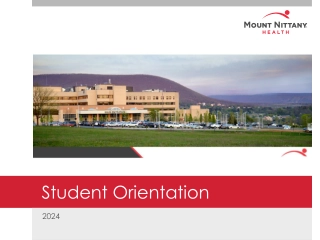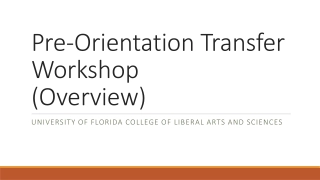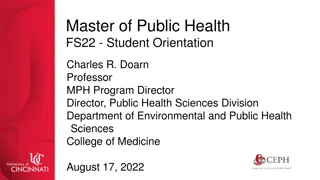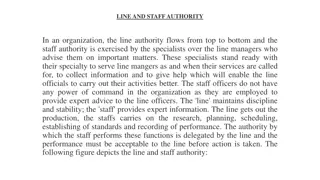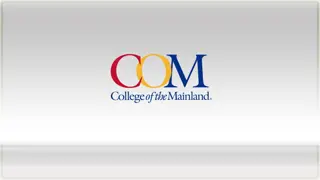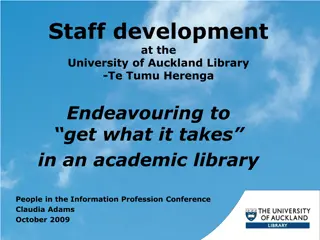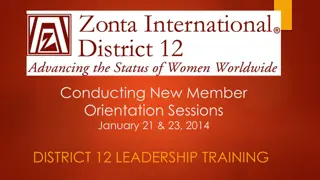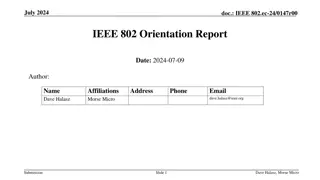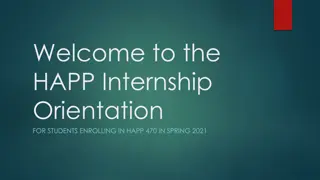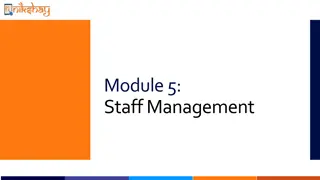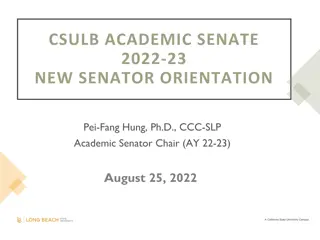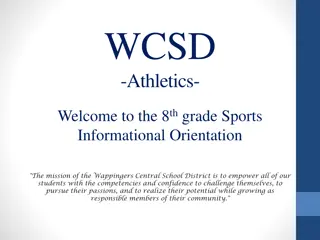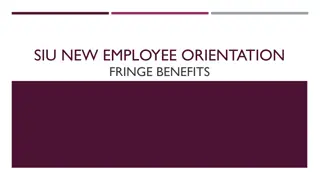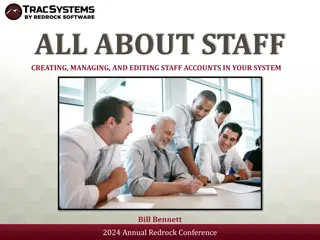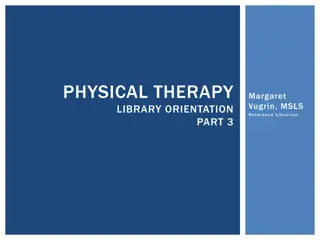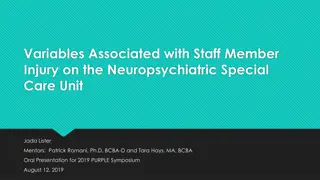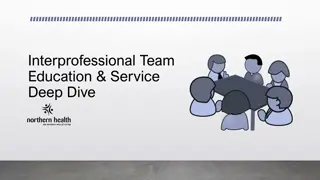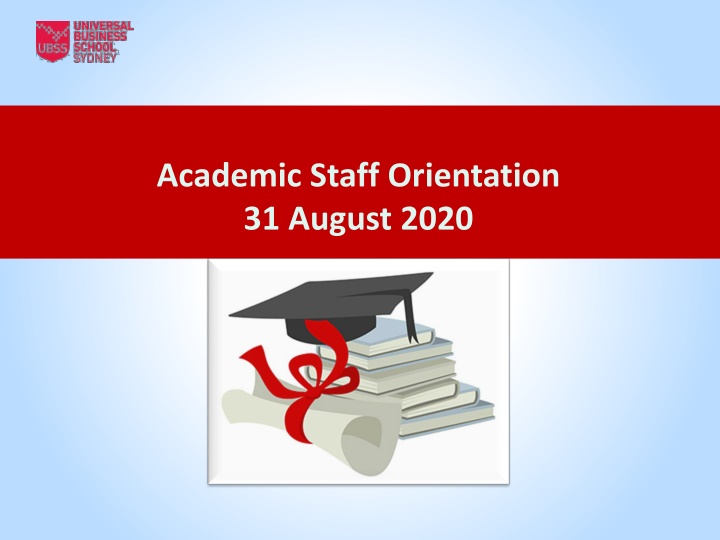
Effective Strategies for Academic Staff Orientation and Professional Development
Discover effective strategies for academic staff orientation, professional development, making the right impression, dealing with COVID, online delivery, and assessment guidelines. Learn how to set expectations, engage with students, address challenges, and ensure successful class delivery.
Download Presentation

Please find below an Image/Link to download the presentation.
The content on the website is provided AS IS for your information and personal use only. It may not be sold, licensed, or shared on other websites without obtaining consent from the author. If you encounter any issues during the download, it is possible that the publisher has removed the file from their server.
You are allowed to download the files provided on this website for personal or commercial use, subject to the condition that they are used lawfully. All files are the property of their respective owners.
The content on the website is provided AS IS for your information and personal use only. It may not be sold, licensed, or shared on other websites without obtaining consent from the author.
E N D
Presentation Transcript
Academic Staff Orientation 31 August 2020
PROFESSIONAL DEVELOPMENT
Professional Records Please keep a record of any Professional Development and Personal Scholarship activities Dress code Business attire Please ensure classes begin on time Please put student assignment teams together Remember we do not do make-up classes Remember deadlines are absolute Please respond to student emails promptly
Making the Right Impression Run an introductory activity and show students that you are human too Let your energy set the tone Establish a class culture of potential and positivity Set expectations both yours and your students right away
Dealing with COVID Introduce the topic wisely Be human and genuine Don t ask your students to forget what happened Always be respectful when talking about emotions Find the right balance between being sensitive and pushing students Discuss COVID as a business challenge Prepare students for an uncertain future No one-size-fits-all approach
Online Delivery Use videos for asynchronous learning Let students learn independently, together Case studies drive class discussion A dojo approach allows students to learn from one another
Online Delivery Introductory and intermission videos are available Shortcut is on the desktop UBSS Intermission Start all sessions on time End all sessions 10 minutes before the end of time slot
ASSESSMENT GUIDELINES
Assessment Guidelines Ensure the right template is used Templates available from Lecturers Support Ensure details are correct including footers Ensure the correct instructions are stated on the cover Ensure numbering is correct Ensure marks for questions add up correctly
Assessment Guidelines Minimum of 3 and maximum of 5 assessments 1 significant assessment of at least 20% in addition to final exam Marking rubric in subject outline & Moodle Contributes to learning outcomes Should align with level of difficulty Constructive and timely feedback required to guide students Policy now for all subjects there are no supplementary tests
Assessment Guidelines Supplementary exam will have a maximum 50% grade. Supplementary Paper should not have more than 25% similarity
Assessment Guidelines Final Exams Final Exams need to have a balanced mix of basic standard knowledge questions, mid-range questions, and more challenging questions, to gain a true indication of the range of achievement of the Learning Outcomes across the student cohort. The placement of questions in the exam paper needs to be carefully considered. There is some research evidence that students, when presented with more difficult questions first, tend to do less well than if presented with the same paper, but with easier questions first, even though the same questions appear in both versions.
Assessment Guidelines All Final Exam papers must be accompanied by a Marking Guide/Marking Matrix with suggested answers and breakup allocation of marks. There should be no more than 25% similarity with the past trimester exam papers. Supplementary Exams should be prepared with no more than 25% similarity with the Final Exam paper. If a Case Study is used, there should be different cases for the Final Exam and the Supplementary Exam or different questions for the same Case. All Lecturers need to fill-in the mapping of test/exam questions to the subject learning outcomes.
Academic Integrity ACADEMIC INTEGRITY IS VALUED AT UBSS
Academic Integrity ACADEMIC MISCONDUCT IS UNACCEPTABLE AT UBSS
Academic Integrity ACADEMIC MISCONDUCT TAKES MANY FORMS Extract from Tool kit to support quality assurance agencies to address academic integrity and contract cheating TEQSA, July 2020
Academic Integrity Academic misconduct at UBSS is overseen by the Academic Integrity Committee that will apply penalties and sanctions for misbehaviour PLEASE ENSURE YOU ARE FAMILIAR WITH THE ACADEMIC MISCONDUCT POLICY LOCATED ON THE UBSS WEBSITE
Academic Integrity Do not use questions for in-class test/quizzes for mid- Trimester tests or exams Test and Exam questions should not be provided to students When doing revision, the questions MUST not be revealed.
Academic Integrity Plagiarism in any assessment will be managed by the lecturer Penalties should be applied as follows: Degree of matching in Turnitin 20% 20% to 50% Greater than 50% Contract Cheating Penalty AIC Formally advised No action 50% 100% 100% Yes Yes Yes
Academic Integrity Guidelines for online exams: 1. Technical problems not notified within one hour 2. Technical problems notified within the one hour 3. Copied and pasted answer for a question from another student 4. Copied information from within the course resources No Supplementary and fail, can appeal Entitled to supplementary Equivalent to cheating in an exam zero marks Acceptable as this is an open book exam Should be marked lower because lacking application As a guide 10% off each question. Plagiarism/cheating zero marks for exam 5. Sourced information from outside course material e.g. Google
MOODLE Hide Moodle page until you are ready Ensure that lexicons are created and placed at the top of the page final exam hidden from students. When entering grades use the lexicons and NOT Gradebook Ensure PDF version of Subject Outline is visible Deadline for download of materials should be set as 18 December Ensure dates are correct Remove unwanted material Use PDF for all material
MOODLE New Interface completed by Kim Sharma

